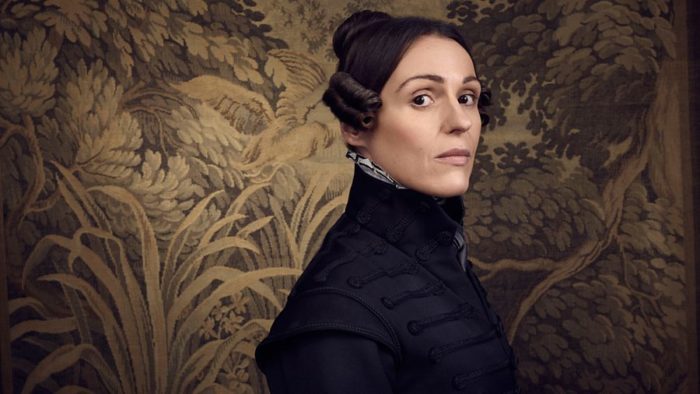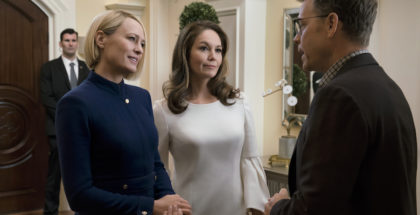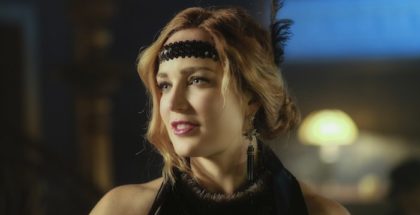Why you should be watching Gentleman Jack
Review Overview
Cast
8Subverted conventions
8Fun
8David Farnor | On 19, May 2019
This spoiler-free review is based on Season 1. Season 2 premieres on BBC One on 10th April.
“Are you a man?” a boy asks Anne Lister (Suranne Jones) in BBC One’s Gentleman Jack. “That’s a question,” she replies. “I’m not a man. I’m a lady… woman. I’m a lady-woman.” It’s a statement of intent from the outsider, who returns to her home town of Halifax in the 1830s, and does so with all the swagger, confidence, purpose and ruthlessness of a man – or, rather, a woman who refuses to let her gender stop her from doing any of the things a man would normally do.
Within the opening two episodes of Sally Wainwright’s sensationally good TV series, we’ve seen her do everything from ruffle feathers and jump over walls to take over a business and wield a weapon. She does all of this while recovering from a broken heart, after her former flame hitched her wagon to a bloke, and starting to woo her new intended. That new intended is Ann Walker (Sophie Rundle), a local, wealthy heiress. “She already seems thoroughly in love with me,” Anne muses to herself, with a knowing smile and no shadow of a doubt. Because the fact that she’s a lesbian in the 1800s, in a society that regards her with suspicion and disapproval, doesn’t for one second stop her narrative from being exactly what she wants it to be.
That sheer determination is breathtakingly fun to witness, and breathes a fresh vivacity into the period drama proceedings. That’s where Wainwright’s writing is so smart; after decades upon decades of costume dramas teaching us what behaviour to expect, Gentleman Jack knows the social rules we regard as normal, and pushes aside each convention with breezy disregard. Then, it invites us along for the ride, to share in the excitement as confidantes, rather than mere onlookers. Wainwright is a queen of modern drama, with shows such as Happy Valley delving into characters and communities with realistic dialogue that never feels scripted, and that sensibility translates wonderfully into a historical setting – this period piece feels electrifyingly contemporary, performed and directed with an immediacy that allows for serious moments and sincere emotions but mostly an endless parade of laughs; Jones is whip-smart good, as hilarious and cunning as she is likeable and heartfelt, her imperious exterior unflappable but not impervious.
This series is based on Anne’s own diaries, which were belatedly deciphered from the code she wrote them in. There’s a wink-to-the-camera conspiratorial streak to her secretive navigation of scandals and business deals, one that Jones delivers to the camera with irresistible verve. But that doesn’t mean that Gentleman Jack has no time for other characters. The show is populated by wonderfully realised companions and enemies, from Timothy West’s wary father and Gemma Jones’ kindly aunt to Gemma Whelan’s scene-stealing sister, Marian, who ironically finds herself always eclipsed by her go-getting sibling. Joe Armstrong is clearly having a whale of a time as Samuel Washington, Anne’s number two, who helps her build on her family estate’s foundations of coal. He’s contrasted brilliantly by Vincent Franklin and Shaun Dooley as the Rawson Brothers, weaselly rival mine magnates who find themselves at the pointy end of Anne’s razor wit – Dooley, in particular, as he shamelessly accepts Anne’s offer of madeira while arguing with her, is a delight.
Politics and power, corporate wheeling and dealing and the joy of a burgeoning romance? Gentleman Jack has everything to make it your new favourite TV show, with a superb cast and costume design to die for. As events unfold and more complications arise, it’s a thrill just to see this unstoppable woman go out and take the life she wants. What’s really thrilling is that she genuinely does: where most LGBTQ+ stories in mainstream cinema and TV tend to see characters fridged, suffering or otherwise denied happiness, Gentleman Jack actually dares to give us something cheerful and hopeful, with a story of people finding their feet and finding each other – a display of traditional storytelling that’s conventional and radical in its convention, like a secret that’s both closely guarded and wide open. (“Sometimes a good friendship is better than a marriage,” Ann’s sister advises her, both supportive and clueless at the same time.)
Jones repeatedly finds new depths to Anne Lister, who evolves from self-focused and driven lone wolf to someone who learns to be vulnerable and care about others – whether that’s agreeing to wear white to a ball, at the behest of Sofie Gråbøl’s wise Queen Marie of Denmark or making sure her aunt is OK. “Don’t hurt me,” she admits to Ann Walker. “I’m not as strong as you think. Well, I am, obviously, but sometimes I’m not.”
Rundle, meanwhile, does much more with her role than you might expect, as Ann also grows, from society beau and captive heiress to someone with a spine who’s not afraid to use it, declaring that she will be the one to make her own decisions about her life. One stronger, one weaker, they meet somewhere in the middle – backed by the gorgeous West Yorkshire countryside. The result is a swooning, light, playful joy of a TV series, one that fuses the drama of 19th century coal-mining with the electricity of a new relationship, and makes it the most natural thing in the world.




















